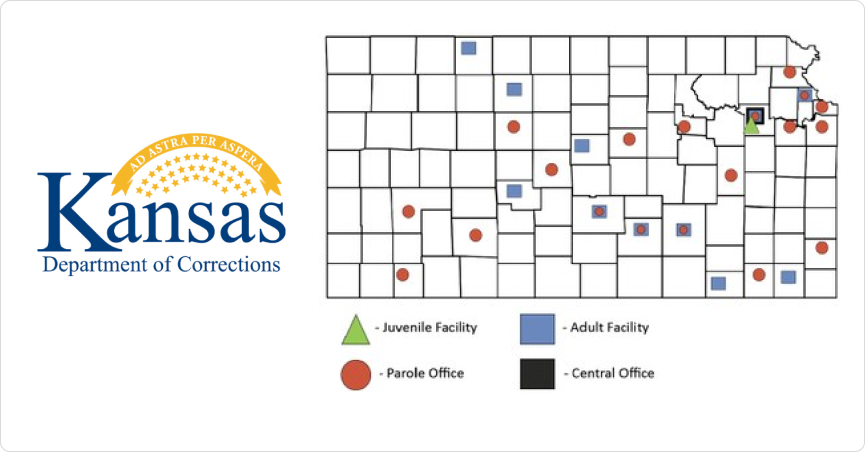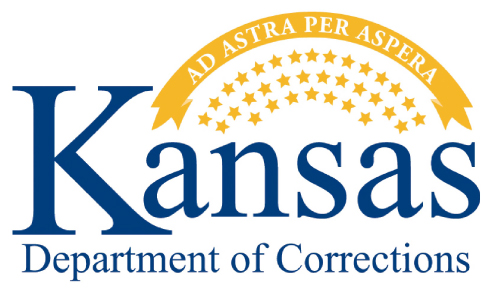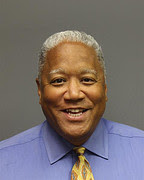KDOC Employment
Join Our Team!
Whether a seasoned professional or a newcomer to the field of corrections, the Kansas Department of Corrections (KDOC) is looking for career-oriented candidates in both operational and administrative areas.
The KDOC employs more than 3,600 Kansans at eight adult correctional facilities, one juvenile correctional facility and including four satellite institutions, 20 parole offices and the KDOC’s Central Office in Topeka.
How to Apply
If you are interested in applying, click on the direct link to each facility’s recruiting page or go to the State of Kansas Job Site and search for open positions within KDOC.
| Facility Direct Application Links | State of Kansas Job Site | |
|---|---|---|
| El Dorado Correctional Facility | Ellsworth Correctional Facility |
To search for and apply for jobs, go to Kansas Jobs Website and search by job title or location. |
| Hutchinson Correctional Facility [link coming soon] | Lansing Correctional Facility | |
| Larned State Correctional Facility | Norton Correctional Facility | |
| Topeka Correctional Facility | Winfield Correctional Facility | |
| Wichita Work Release Facility [link coming soon] | Kansas Correctional Industries [link coming soon] | |
| Kansas Juvenile Correctional Complex | ||
I Make a Difference by...

"This has been my calling. This is what I’m good at."

"This has been my calling. This is what I’m good at."

"This has been my calling. This is what I’m good at."

"This has been my calling. This is what I’m good at."
The Kansas Department of Corrections is an Equal Opportunity Employer Veterans Preference Eligible (VPE)
From the Secretary
Listen in as Kansas Secretary of Corrections Jeff Zmuda shares thoughts on the importance of staff and family!
Career Opportunities and Locations

Career Opportunities
Explore the career opportunities available with the KDOC
- Juvenile Corrections Officer
- Facilities Maintenance
- Corrections Counselor
- Human Resources
- Corrections Manager
- Industry Manager
- Corrections Officer
- Library Science
- Deputy Warden
- Accounting
- Warden
- Chaplain
- Parole Officer
- Research
- Parole Supervisor
- Communications
- Program Consultant
- Staff Development
- Administrative Support
- Information Technology
Job vacancies are listed at www.jobs.ks.gov
The Department of Corrections is an Equal Opportunity Employer
Benefits

KDOC is committed to maintaining the health and well-being of its employees. We offer a wide range of benefits designed to address the diverse needs of our employees and their families.
-
Competitive Salaries
-
Stability, Meaningful Work, and Promotional Opportunities
-
Vacation Leave
Eligible employees begin earning leave upon employment. Accrual for full-time employees is based on years of continuous service and hours in pay status.
Employees start earning 3.7 hours per biweekly period and accrual rates increase after 5, 10, and 15 years.
Accrual is prorated for non-exempt employees who work less than full-time during a given pay period. -
Sick Leave
Eligible employees earn 3.7 hours per biweekly period which can be used for eligible personal and family condition.
Accrual is prorated for non-exempt employees who work less than full-time during a given pay period. -
Paid Holidays
Eligible employees receive 9 paid holidays per year plus a discretion holiday.
The Governor may designate additional days. -
Work-Life Balance Programs: Bereavement, Parental, Military, Jury, and other options.
- Funeral Leave: Eligible employees are provided up to 6 days of leave with pay upon the death of a close relative.
- Shared Leave: Donated leave for eligible employees to be used for serious, extreme or life threatening conditions of their own or a family member.
- Job Injury Leave: Eligible employees can receive up to 6 months of qualifying job injury leave, upon approval of employing agency.
- Jury Duty Leave: Eligible employees are provided leave with pay for jury duty and many other required court appearances.
- Military Leave : Eligible employees are provided up to 30 days of paid leave for military duty within each 12-month period beginning October 1 and ending September 30 of the following year. Other types of military leave are also available depending on the particular circumstances.
- Leave Without Pay: Eligible employees are provided time off without pay for special circumstances upon approval of employing agency.
- Disaster Leave: Employees who qualify as American Red Cross certified disaster service volunteers can be approved for up to 20 days leave for certified disaster volunteer service (Level II or above).
- Payment for Unused Sick Leave: Upon retirement, eligible employees receive partial payment for unused sick leave in excess of 800 hours after a minimum of 8 years of service.
- Donor Leave: Eligible employees can receive up to 30 days paid to donate organs, tissue, marrow, or blood.
-
Health Insurance
Medical, dental, prescription & vision coverage options.
-
Flexible Spending Accounts
Health and dependent care accounts. Employees make annual elections pre-tax.
-
Retirement
The Kansas Public Employees Retirement System (KPERS) is a defined benefit program.
-
Deferred Compensation
Voluntary defined contribution retirement plan. Contributions made on a pre-tax basis.
-
Group Term Life Insurance
Coverage equal to 150% of annual salary with a purchase option of additional $200,000 coverage.
-
STAR Discount Program
Product and service discounts.
-
Health, Wellness, and Employee Assistance Program (EAP)
Contacts
KDOC needs dedicated and resourceful men and women who want to join us as we strive toward our vision of a safer Kansas. While correctional officer and parole officer positions compose more than half of the KDOC’s workforce, employment opportunities are also available in many other professional and technical areas.
Please reach out to the following Human Resources Offices with questions.
Contact Human Resources HR@doc.ks.gov
-
Central Office and Parole
-
Ellsworth Correctional Facility (ECF)
-
El Dorado Correctional Facility (EDCF)
-
Hutchinson Correctional Facility (HCF)
-
Kansas Juvenile Correctional Complex
-
Lansing Correctional Facility (LCF)
-
Larned Correctional Mental Health Facility (LCMHF)
-
Norton Correctional Facility (NCF)
-
Topeka Correctional Facility (TCF)
-
Winfield Correctional Facility (WCF) and WCF – Wichita Work Release
-
Northern Parole Services
-
Southern Parole Services
Corrections Officer

Immediate Openings Available. No Experience Necessary. COME JOIN OUR TEAM OF PROFESSIONALS.
Corrections Officers Qualifications:
- Must have earned a high school diploma or equivalent.
- Must be 18 years of age or older at the time of appointment.
- Must be free of felony convictions; and free of misdemeanor or felony domestic violence convictions.
- Must be free of DUI convictions within the past 24 months.
- Must be free of adult misdemeanor drug use or possession convictions in the past 60 months.
- Must be free of pending criminal charges, indictments or outstanding warrants
- Must successfully complete an employment and background check.
- Must take and pass written Corrections Officer Test, which assesses aptitude for the job.
- Must posses a valid driver's license.
- After a conditional offer of employment, must take and pass a drug test, TB screen and physical exam.
- Must be able to perform essential/event-driven functions of this position.
Class/Job Specifications for a Corrections Officer IA ((Entry-level Corrections Officer))
Beginning Salary for a Corrections Officer IA is $18.26/hour or $37,980.80/year.
Corrections Officers are subjected to a one-year probationary period.

The Kansas Department of Corrections is a proud partner in the PaYS program developed by the U.S. Army to appeal to young people interested in civilian jobs after serving in the Army.
For testing and applicant information, contact:
|
Ellsworth Correctional Facility (ECF) Ellsworth (Ellsworth County) |
(785) 472-6295 |
|
El Dorado Correctional Facility (EDCF) El Dorado (Butler County) |
(316) 322-2056 |
|
Hutchinson Correctional Facility (HCF) Hutchinson (Reno County) |
(620) 728-3281 |
|
Lansing Correctional Facility (LCF) Lansing (Leavenworth County) |
(913) 727-3235 x 57022 |
|
Larned Correctional Mental Health Facility (LCMHF) Larned (Pawnee County) |
(620) 285-8000 |
|
Norton Correctional Facility (NCF) Norton (Norton County) |
(785) 877-6642 |
|
Topeka Correctional Facility (TCF) Topeka (Shawnee County) |
(785) 559-5109 |
|
Winfield Correctional Facility (WCF) Winfield (Cowley County) |
(620) 221-6660 x 206 |
|
WCF - Wichita Work Release Wichita (Sedgwick County) |
(620) 221-6660 x 206 |
Transforming Lives for the Safety of All

The Community and Field Services Division is responsible for community-based supervision of offenders who have been released from correctional facilities on parole, post-release supervision or conditional release, but who have not been discharged from their sentence. The Community and Field Services Division also includes the Interstate Compact Unit that is responsible for regulating the transfer and movement between states of adult felony parole and probation offenders under community supervision. The purpose of post-incarceration supervision is to contribute to public safety and to assist offenders in successfully reintegrating into the community.
Q: What is the difference between a Classified and Unclassified employee?
A: The State of Kansas has two categories of employees – classified and unclassified.
Classified Employees:
- State of Kansas has established job specifications for all positions assigned to classified service.
- Agencies may only hire classified employees utilizing state regulations and/or memorandum of agreement protocols.
- Pay is governed by the legislature and the Governor Directives and the pay is in accordance with a pay matrix approved by the Governor.
- Classified employees are protected by civil service protocols. Formal discipline and/or termination may be reviewed by the Kansas Civil Service Board if the employee requests within established timeframes. The Civil Service Board may modify the agency decision.
- Parole Officers I, II and Supervisors are in classified service.
Unclassified Employees
- The State of Kansas has established job titles for unclassified employees but these may vary from agency to agency.
- Agencies may hire unclassified employees utilizing classified protocols or an offer may be extended without going through the interview process.
- Unclassified employees are appointed positions requiring approval to fill and, once an offer is extended, the amount must be approved by the Governor.
- There are no established pay ranges for unclassified employees. The Kansas Department of Corrections (KDOC) utilizes the classified pay matrix as a guideline.
- Unclassified employees are considered to be “at will,” they may be disciplined or discharged.
- The majority of employees at the Kansas Department of Corrections in unclassified service are: managers, administrative support and maintenance.
Q: What does it mean to be exempt?
A: The federal Department of Labor has established guidelines which must be followed by all organizations, government and non-government, in determining the exempt or non-exempt status of employee. The category assigned is determined from an approved position description utilizing federal guidelines
Non-exempt (or Hourly):
Non-exempt employees are paid an agreed upon wage and are assigned to work an agreed upon number of work hours;
- Hours worked over 40 in a work week are compensated at time and a half per hour for every hour worked.
- The State of Kansas allows agencies to offer limited compensatory time in lieu of overtime.
- States may pass legislation which allows for specific jobs to be on a different work week for overtime purposes.
- A non-exempt employee could be made exempt if changes are made to the position description or the federal guidelines.
- Changing a non-exempt employee to exempt in order to eliminate the need to pay time and a half carries severe penalties to the agency or company to include, but not limited to, paying back for all overtime that would have been worked the past two years.
- Parole Officer I and II are considered to be non-exempt and will receive overtime or compensatory time for all hours worked over 40 in a workweek.
Exempt (or Salaried):
- Must be considered full-time and will receive the same amount of pay each paycheck regardless of the hours worked.
- Exempt employees are required to work a minimum number of hours a day, and if full-time, at least 40 hours a week. They are not paid more if they work 50 hours, and depending on the reason, at times if they do not work 40 hours, they are also paid the same.
- Employees who consistently fail to work at least 40 hours a week may be changed to non-exempt or hourly status and the above rules will apply.
- Parole Supervisors are considered to be exempt.
Q: As an applicant, what should I expect during the interview stage?
A: All applicants are screened by members of a Human Resources team utilizing an approved position description and guidelines from the managers and supervisors. Qualified applicants may be contacted to participate in one or more interviews. To be considered for employment, applicants must meet all required criteria and have submitted all documentation that is requested in the job posting. Most interviews are in a behavior-based format where the applicant would be asked how they have reacted in a specified set of circumstances. Role plays, written assignments or presentations may also be required as part of the interview process.
Q: What benefits does the Kansas Department of Corrections offer?
A: All full-time state employees contribute immediately to the KPERS retirement program and have several options available for health insurance that includes both dental and vision. Employees earn both sick and vacation leave, may have all Governor approved holidays off or be compensated for working on that day, and have an annual Discretionary Holiday to use as needed. Any State of Kansas programs (i.e., STAR) would also be made available to Department of Corrections employees. See State of Kansas website for currently available programs.
Q: Would I be working with juveniles?
A: Our population of offenders either are adults or have been convicted of a crime and adjudicated as an adult. The KDOC’s Juvenile Services Division primarily works with juvenile offenders.
Q: Would I be entering into the adult prisons to complete my job?
A: On occasion, Parole Officers may be required to visit an adult facility. It is encouraged to tour adult facilities to have a better understanding of the entire Department.
Q: Is my work schedule flexible?
A: With your supervisor’s permission, work schedules may be flexible typically after a Parole Officer fulfills his/her basic training requirements. Parole Officers may be required to work a ‘late night’ two nights per month.
Q: What would my caseload size be?
A: Caseload sizes vary greatly by offender populations, the Department’s needs, and your specific geographic location. The assessed risk level is also taken into consideration when distributing cases.
Q: What training is required?
A: New Parole Officers are required to complete 200 hours of training during their first year and 40 hours of training annually thereafter. Training can come in a variety of ways from informal job shadowing, formal classroom setting or online computer courses.
Q: Is overnight travel required for training?
A: Parole Officer basic training is taught in a variety of locations, including but not limited to Olathe, Topeka and Wichita. Overnight travel may be required in some instances at no expense to the employee.
Q: Are company vehicles provided?
A: The Department provides vehicles during working hours at no expense to the employee so he/she may complete all necessary fieldwork and training requirements.
Q: How long is my probationary period?
A: Probationary periods may vary but typically are nine months for a new state employee.
Q: Is my starting wage negotiable?
A: The State of Kansas utilizes the state’s pay range/level system; therefore, the starting wage for a classified employee is not typically negotiable.
Q: What safety equipment is provided?
A: Once certified, Parole Officers have the option of carrying both Tasers and OC Spray.
Q: Would I be assigned a field partner?
A: All Parole Officers are encouraged to complete fieldwork with partners for officer safety.
Q: Am I able to carry my own personal firearm while on the job?
A: Where allowed by State of Kansas Law, Parole Officers are allowed to carry their own personal concealed firearm under certain circumstances as set forth in KDOC policy. Carrying a firearm is not a job requirement. Those who choose to carry a firearm do so for personal protection and not part of their job duties
Q: Does the Kansas Department of Corrections offer an internship or volunteer program?
A: Yes, however programs vary by office. If interested in an internship or volunteer program, please contact the Kansas Department of Corrections Recruiter at 785-296–0041.
Q: What is the difference between Parole and Post Release offenders?
A: These two terms are often used interchangeably but Parole more accurately refers to those offenders sentenced for a crime prior to July 1, 1993 and are serving an indeterminate sentence while those sentenced after July 1, 1993 are considered on post-release supervision and serving a determinate sentence. For those on parole, the period of time on parole is determined by their performance and the date of ultimate release is decided by the Kansas Prisoner Review Board. For those on post-release supervision, its length is part of the sentencing court’s original sentence and cannot be modified except by good time awards.
Q: As a Parole Officer, would I have arresting authority?
A: Though Parole Officers are considered Law Enforcement, the Kansas Department of Corrections does not allow arresting authority.
Q: What is an LSI-R?
A: The LSI-R (Level of Service – Revised) is an assessment tool used to gauge the likelihood of an offender re-offending. The LSI-R is administered upon entry into the KDOC system and then updated throughout the supervision term.
Q: What is TOADS and OMIS?
A: TOADS (Total Offender Accountability Document System) and OMIS (Offender Management Information System) are two of the Department’s current case management and data systems.
Q: As a Parole Officer, would I have to testify in court before a Judge?
A: Offenders on Parole/Post Release supervision are under the jurisdiction of the Secretary of Corrections and not a local judge. It is rare that a Parole Officer would have to testify in court. Parole Officers may be required to appear at revocation hearings held by the Kansas Prisoner Review Board.
Q: I have a family member who is or was formerly incarcerated – does this exclude me from employment?
A: Having a friend or family member in the KDOC system would not affect an applicant’s employment opportunities as long as accommodations could be made where the employee was not involved in the direct supervision/decision making of the family member.
Q: Would a Parole Officer ever supervise somebody on probation?
A: Parole Officers also may supervise probationers from other states via the Interstate Compact Agreement.
Q: What does a typical workday look like for a Parole Officer?
A: While a Parole Officer’s primary concerns are ensuring both public and victim safety, the majority of their work day often includes the following: responding to release plan investigations, conducting home and field contacts, making computer entries, report writing, substance abuse testing, responding to violations, and using evidenced-based practices and case management tools/strategies to help motivate offenders into making the necessary changes to support a pro-social and law-abiding lifestyle.
Juvenile Corrections Officer

Immediate Openings Available. No Experience Necessary.
COME JOIN OUR TEAM OF PROFESSIONALS.
The Juvenile Corrections Officer I is responsible for supervising residents in living units, shower rooms, recreation areas, during visitations and while on transfers to activities, dining room, or other facility functions in order to maintain security, safety, sanitation and good order of the facility.
Juvenile Corrections Officers Qualifications:
- Must be 21 years of age at time of appointment.
- Must have earned a high school diploma or equivalent.
- Must be free of felony conviction or adjudication, whether or not expunged.
- Must be free of conviction or adjudication by a court of law or court-martial, of a crime punishable by imprisonment for a term exceeding one year (whether or not the sentence was imposed).
- Must be free of conviction as an adult of Driving Under the Influence (or comparable law regarding driving while intoxicated or under the influence of a controlled substance) in the past 36 months, as an adult or juvenile.
- Must be free of conviction or adjudication of a misdemeanor involving drug use or possession in the past 60 months.
- Must be free of any pending criminal charges, indictments or outstanding warrants.
- Must meet the minimum qualifications for the Juvenile Corrections Officer I classification (See "Minimum Qualifications" below).
- Must be able to perform the essential/event-driven essential functions of this position.
- Subject to an employment and criminal background check (including, but not limited to, a KBI and NCIC criminal background check and KDCF Child Abuse and Neglect Central Registry check).
- Must possess a valid driver's license.
- After a conditional offer of employment, must take and pass a physical agility test, physical exam, drug test and TB screen.
Class/Job Specifications for a Juvenile Corrections Officer I
Beginning Salary for a Juvenile Corrections Officer I is $18.26/hour or $37,980.00/year.
Juvenile Corrections Officers are subject to a six-month probationary period.

The Kansas Department of Corrections is a proud partner in the PaYS program developed by the U.S. Army to appeal to young people interested in civilian jobs after serving in the Army.
For applicant information, contact:

Office
Kansas Juvenile Correctional Complex (KJCC), located in Topeka, Shawnee County:
Job vacancies are listed at www.jobs.ks.gov
Parole Officers

Become a Parole Officer
No Experience Necessary.
Putting Public Safety First
“As ever-larger numbers of people serve their time and return to the community, parole supervision agencies can play a critical role in the promotion of community safety, successful reintegration, and individual accountability.”
Individuals interested in a career in parole services should read this paper on the changing methods of community supervision and their importance to public safety.
For Frequently Asked Questions about Community & Field Services’ Positions, click here.
Parole Officer Qualifications:
- Must have earned a bachelor’s degree with at least 24 hours of criminal justice, social science or behavioral science
- Must be free of felony convictions; and free of misdemeanor or felony domestic violence crime
- Must be free of DUI convictions within the past 24 months
- Must be free of adult misdemeanor drug use or possession convictions in the past 60 months
- Must be free of pending criminal charges, indictments or outstanding warrants
- Must successfully complete an employment and background check
- Must posses a valid driver’s license
- After a conditional offer of employment, must take and pass a drug test, TB screen an physical exam
- Must be able to perform the essential/event-driven functions of this position
(Entry-level Parole Officer)
Beginning salary for a Parole Officer I is $17.39/hour or $36,171.20/year.
Parole Officer are subjected to a one-year probationary period.
The Department of Corrections is an Equal Opportunity Employer.
Veterans Preference Eligible (VPE) information can be found at http://da.ks.gov/ps/aaa/recruitment/veterans.htm




